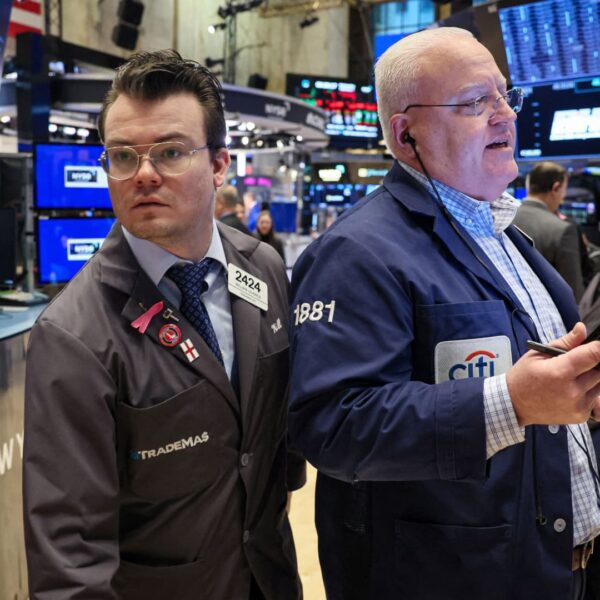courtneyk/E+ via Getty Images
Listen below or on the go on Apple Podcasts and Spotify
A weak August payrolls report could put a half-point Fed cut back in play. (0:17) Chinese EV makers report deliveries. (3:55) Shutdown of X starts in Brazil. (5:09)
Labor Day week on Wall Street will be all about … well, labor.
The August jobs report hits Friday and after the fireworks sparked by the July numbers expect a lot of jockeying for position ahead of the print.
Economists are expecting nonfarm payrolls to have risen by 164,000, with the unemployment rate ticking down to 4.2% and average hourly earnings up 0.3%.
Nomura said underlying employment growth is cooling, but the weakness seen in July appeared to be exaggerated by a temporary weather impact, which should normalize in August.
“Hiring is slowing, which should put upward pressure on the unemployment rate in the medium term, but without widespread layoffs the rise should be gradual,” they added.
Pantheon Macro says apart from Homebase figures, which seem to be struggling to track official numbers, other labor indicators “generally point to a labor market which is softening, though not imploding.”
But a weak payrolls number could put a September Fed rate cut of 50 basis points back on the table. Right now the markets a pricing in just a 30% chance of a half-point cut but they are also pricing in a full point of cuts by the end of the year with just three meetings to go.
In response to the latest Fed minutes, T.S. Lombard economist Steven Blitz says: “The FOMC is a lot less sure about whether policy is in the right spot than it was six weeks ago. Then, we read how monetary policy was ‘well positioned’ to handle whatever came next. No such phrasing in July, just handwringing about the uncertainty of how policy leads and lags will affect economic activity.”
“With employment risk up and inflation risk down … some participants ‘noted the risk that a further gradual easing in labor market conditions could transition to a more serious deterioration.'”
“This is the problem with a data-dependent approach – when the bad data show up, policy is already late.”
On the earnings front, Dollar Tree (DLTR) reports Wednesday with tension running high in the discounter sector after Dollar General (DG) saw a 30% earnings decline.
Dollar General had its worst trading day ever after the company warned on “financially constrained” customers. The view from Wells Fargo is that Dollar General’s turnaround efforts have clearly run into problems.
Analyst Edward Kelly says: “We believe the macro, competition, and underinvestment are taking a toll.” He also thinks the retailer needs to make a large investment in labor (hours/rates) to restore confidence in the chain. Evercore ISI analyst Michael Montano also said Dollar General’s results show the challenge of maintaining market share with Walmart (WMT) winning in a slower growth environment.
Amid the spotlight on Dollar General, Dollar Tree shed 14% during the week.
Also on the earnings calendar:
Zscaler (ZS), GitLab (GTLB) and PagerDuty (PD) weigh in on Tuesday.
Along with Dollar Tree on Wednesday, Hewlett Packard Enterprise (HPE), Dick’s Sporting Good (DKS), Casey’s General Stores (CASY), C3.ai (AI) and ChargePoint Holdings (CHPT) report.
And on Thursday, Broadcom (AVGO), DocuSign (DOCU), Samsara (IOT), NIO (NIO), Rent the Runway (RENT) and Planet Labs (PL) issue results.
Conferences should also add some action to the short trading week.
Intel (INTC), which is worried about barbarians at the gate amid a drop of more than 55% year to date, will host an event in Berlin to launch the next generation of Core Ultra processors, code-named Lunar Lake. During the livestreamed event, the company will reveal details on the new processors’ x86 power efficiency, core performance, graphics performance and AI computing power.
Keynote addresses from Roblox’s (RBLX) Developers Conference could also capture attention. And the Citi Global Technology, Media and Telecom Conference will include participation from Microsoft (MSFT), Super Micro Computer (SMCI), Dell Technologies (DELL), Intel, MongoDB (MDB) and Etsy (ETSY). The Citi TMT conference has led to share price moves in the past based off management updates.
In the news this weekend, Chinese EV makers reported delivery numbers.
BYD Company (OTCPK:BYDDF) posted another record month of new energy vehicle sales in August, as sales of plug-in hybrid electric vehicles hit a sixth-consecutive record high since March. China’s biggest-selling auto brand reported sales of 373,083 vehicles in August, surpassing July’s record of 342,383 units. That’s up 30% from the year ago.
Li Auto (LI) reported 48,122 deliveries in August, up 37.8% year over year, bud down from 51,000 in July. The company’s share of the RMB200,000 and higher NEV market grew to 18% in July, outpacing Tesla (TSLA) to take the top sales spot among NEV brands in China.
XPeng (XPEV) said it has delivered 14,036 Smart EVs in August, an increases of 3% year over year and 26% over the prior month.
And NIO (NIO) said it delivered 20,176 vehicles in Augus, down for the second month. It delivered 11,923 premium smart electric SUVs, and 8,253 premium smart electric sedans. Deliveries are down 1.5% sequentially and up 4% from the prior year.
And the shutdown of X, formerly Twitter, in Brazil started early Saturday. The AP says it is largely inaccessible on both the web and through mobile apps. Elon Musk refused to name a legal representative to the country, missing a deadline imposed by Supreme Court Justice Alexandre de Moraes. The two have been fighting for months over free speech, far-right accounts and misinformation.
Musk said: “X is the most used news source in Brazil. It is what the people want. Now, the tyrant de Voldemort is crushing the people’s right to free speech.”
De Moraes wrote in his ruling: “Elon Musk showed his total disrespect for Brazilian sovereignty and, in particular, for the judiciary, setting himself up as a true supranational entity and immune to the laws of each country.”
For income investors, McDonald’s (MCD), Lockheed Martin (LMT) and Nike (NKE) go ex-dividend on Tuesday. McDonald’s pays out on Sept. 17, while Lockheed pays out on Sept. 27 and Nike pays out on Oct. 1.
Cigna (CI) goes ex-dividend on Wednesday with a payout date of Sept. 19.
Companies forecast to increase quarterly dividend payouts include VICI Properties (VICI) to $0.44 from $0.415, Stewart Information (STC) to $0.50 from $0.475, and Brady (BRC) to $0.24 from $0.235
And in the Wall Street Research Corner, not all big shorts are created equal.
There’s a relatively weak correlation between short positions in some assets and distress measures, indicating that not all heavily shorted stocks are undergoing difficulties defined by traditional metrics. That’s according to S3 Partners, a well-known tracker of short-interest data.
Market sentiment and valuation concerns are among the factors that can drive short interest beyond immediate distress signals.
S3 examined three measures of bearishness for stocks:
- Average analyst ratings ranging from 1-5
- Credit default swap spreads, reflecting the cost to insure a company’s bonds and a bankruptcy-risk measure
- Altman Z-Score, a metric that uses fundamental indicators to estimate bankruptcy probability
Analyst Leon Gross says: “Our analysis reveals that while there is a statistically significant correlation between the size of short positions and these distress measures, the correlation is relatively weak, with a coefficient of only 0.20.”
Investors “might short stocks based on valuation concerns rather than specific distress signals,” Gross said.
Shorting an asset may also be a part of broader strategies or hedging activities not linked to distress.
S3 identified “notable outliers” during its analysis including American Airlines (AAL), which had a high short position of ~18.4% but a “moderate” CDS spread of 200 basis points, and a low Altman Z-Score, pointing to minimal bankruptcy risk.
“This discrepancy suggests that despite moderate distress signals, AAL is heavily shorted, possibly due to specific market views or factors not captured by these metrics,” Gross said.
Editor’s Note: This article discusses one or more securities that do not trade on a major U.S. exchange. Please be aware of the risks associated with these stocks.















